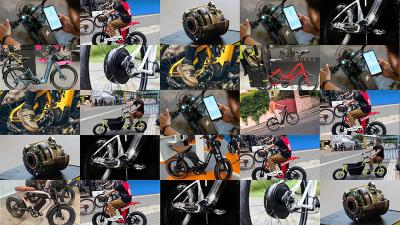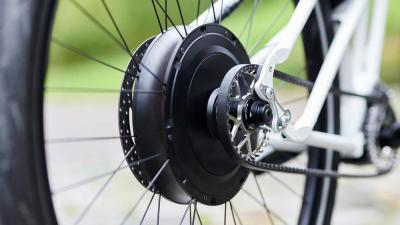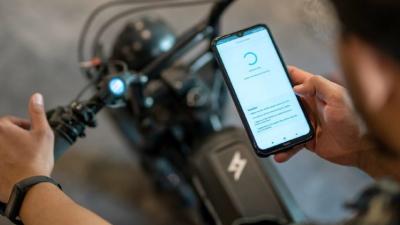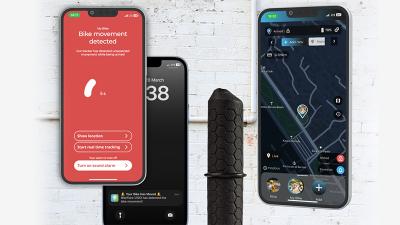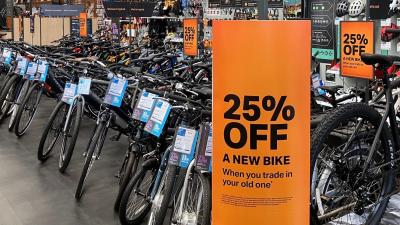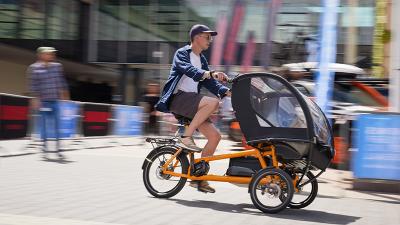Digital anti-theft devices improve e-bike usability
The combination of a growing demand, an increasing average retail price and rising e-bike thefts gave a boost to the market of digital anti-theft devices. The use of a single rear wheel lock is not considered as sufficient anymore. Although official statistics on the number of e-bikes stolen is not available in many countries, enhanced anti-theft devices is regarded as essential.
Not only are users looking for additional safety precautions, insurance companies are also stepping up the anti-theft requirements needed in some countries. The availability of these anti-theft options for e-bikes is growing quickly. Many of these use the latest technologies often developed for other consumer goods and now redesigned for specific use.
A range of these safety devices were already available, but 2023 has seen a particular large number of new companies entering this market or updates of existing services. For example motorcycle security company Monimoto who launched a GPS anti-theft device for e-bikes called Cycloop. It uses GPS and cellular signals to track a bike that is stolen or tampered with and alerts the owner and authorities to the location of the bicycle.
“Bicycles are getting more expensive each year. The advent of electric bikes and scooters pushes the value of ridables even further. This calls for advanced security solutions in the micromobility market,” says Bruno Rimkunas, head of business development at Monimoto. The company already handles an average of 189 motorcycle security incidents per week. The Cycloop security system features three components: the Cycloop device, a keyfob and a smartphone app. The Cycloop device mounts on the bicycle frame. Just like with high-end car alarms, the keyfob is used to identify the bike’s owner. When Cycloop detects a keyfob in proximity, it automatically disarms the device.
Twinner by Thomas Binggeli
A more advanced anti-theft system was specified by former Stromer founder Binggeli who launched a new speed-pedelec brand this year. Called Twinner this high-end brand comes with an anti-theft which is integrated in the ‘Smart Hub operating system’ which also includes driving dynamics and energy management.
GPS concealed within the handlebar
The BikeFlare Visio is a different kind of GPS tracker. It comes with an audible alarm that reacts to bicycle movement. The device is made for all types of bikes and is concealed within the handlebar. It fits all standard-sized handlebar diameters between 17 and 22 mm. Users will get an automatic Bike-Has-Moved alert after the bike is parked for more than 5 minutes. Or if they want the highest level of security they can manually ARM/activate BikeFlare-Alarm.
The BikeFlare Visio is put on the market by YFLab based in Ljubljana, Slovenia. While the main reason behind the automatic Bike-Has-Moved alerts is user convenience, manually activated BikeFlare-Alarm presents the highest level of bicycle protection. The latter will have lower false alert sensitivity and send the highest-priority notifications, which will override do-not-disturb phone settings. When activating the BikeFlare alarm users can also choose between a silent or audible alarm. The BikeFlare VISIO operates in 130 countries and is priced at €129 plus a subscription which starts €3.15 a month.
Last mile recovery
Last mile recovery for GPS systems in combination with Bluetooth often turns out to be impossible. Once a stolen e-bike is put in a container and transported to another location, the e-bike can’t be traced any more. The Dutch company Allsetra made its last mile recovery technology now also available for e-bikes. The technology, approved by insurance companies, is already used for cars and expensive tools. The company operates its own service desk and is part of a tracing company. Allsetra builds on a 5 year experience in the free floating micormobility business where it turned out that standard GPS anti-theft systems were not sufficient. Michael Devid CTO van Allsetra claims that they have trace and returned 97% of all stolen shared e-bikes and e-scooters in the past years. The Allsetra enhanced security system is now available on the Freebike e-bikes.
Cooperation with insurance companies
Some long term industry partners have taken existing technology to the next level. For example Comodule who has been supplying GPS tracking technology to several e-bike system suppliers and OEMs in the market. The Estonia based company has partnered with nexsurance to introduce a discounted insurance offer for Comodule-connected e-bikes in Germany. This insurance coverage recognizes the advanced safety features of connected e-bikes, mitigating the risk of theft and increasing the chances of bike retrieval.
“Digital security features have already proven to reduce the number of missing bikes, but seamless and affordable insurance has always been the goal and essential part for increased sense of safety for e-bike owners,” says Teet Praks, founder and CEO of Comodule.
In Germany, 73% of e-bikes are bought together with an insurance. Thus, discounted insurance rates make IoT more attractive also to e-bike manufacturers. From the savings of the reduced insurance cost, the connectivity expense can be significantly reduced. All e-bikes in Germany which are connected by Comodule, qualify for the discount.
Digital registration
Not all bikes that get lost are stolen. In many case they have been moved for various reasons like illegal parking. Often owners think their bike has been stolen but in fact their bike ended up in a depot for lost-goods. For those situations, the Nolongerlost tags with a QR code is a useful tool to retrieve a lost bike. Nolongerlost is not a safety device but more of a low-cost digital registration system for local authorities to trace the owner of a lost bike. A partially similar system is currently being implemented in Brussels and will be expanded to a larger part of Belgium in 2024. This system using QR code stickers, is aimed at bicycle registration and locating bicycles. The system used in Belgium proves the need and effectiveness of digital bicycle registration.
